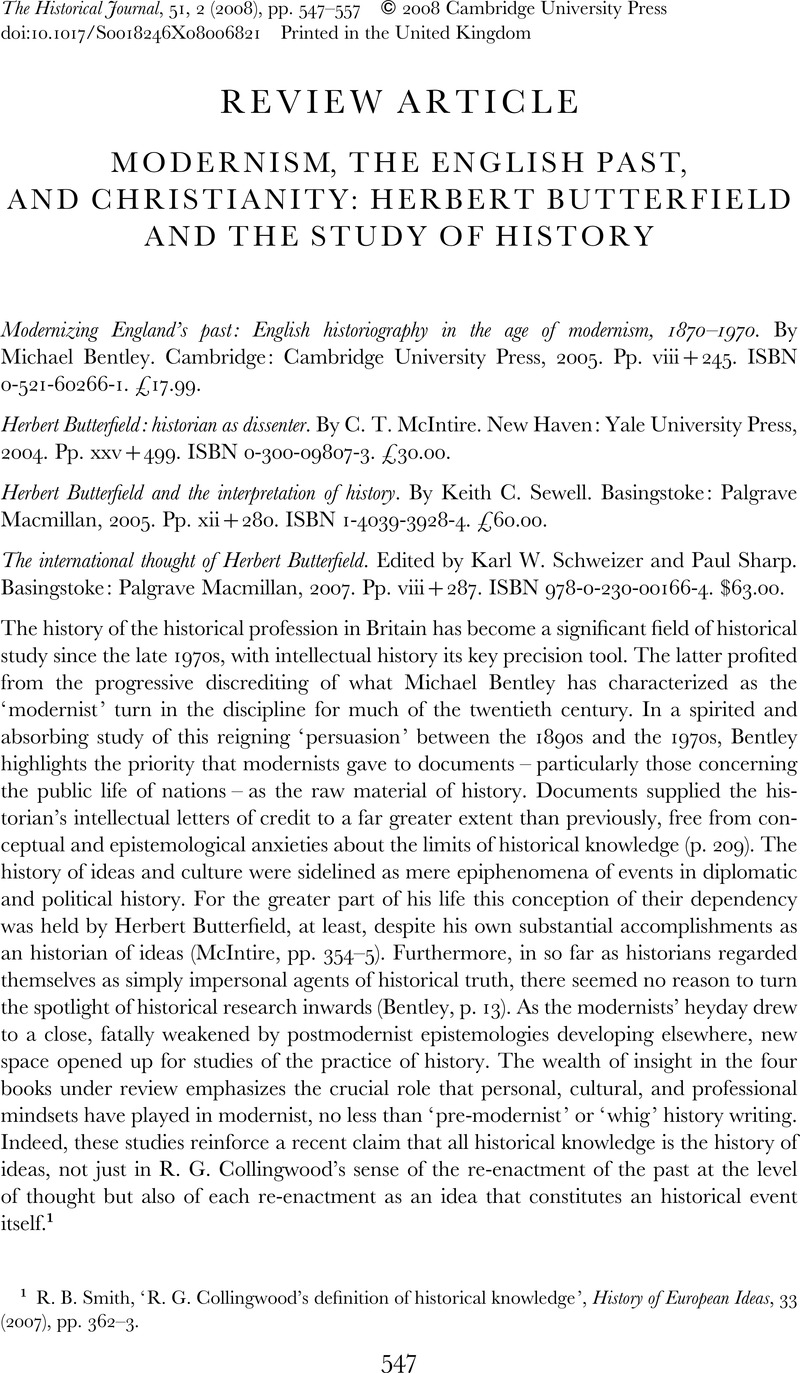Article contents
MODERNISM, THE ENGLISH PAST, AND CHRISTIANITY: HERBERT BUTTERFIELD AND THE STUDY OF HISTORY
Published online by Cambridge University Press: 05 June 2008
Abstract

- Type
- Review Article
- Information
- Copyright
- Copyright © 2008 Cambridge University Press
References
1 Smith, R. B., ‘R. G. Collingwood's definition of historical knowledge’, History of European Ideas, 33 (2007), pp. 362–3Google Scholar.
2 P. B. M. Blaas, Continuity and anachronism: parliamentary and constitutional development in whig historiography and in the anti-whig reaction between 1890 and 1930 (The Hague, 1978); J. W. Burrow, A Liberal descent: Victorian historians and the English past (Cambridge, 1981); R. Jann, The art and science of Victorian history (Columbus, OH, 1985).
3 Murray to Zimmern, 23 Mar. 1944, MS Zimmern 48 (27), Bodleian Library; J. Stapleton, ‘The Classicist as liberal intellectual: Gilbert Murray and Alfred Eckhard Zimmern’, in C. Stray, ed., Gilbert Murray reassessed (Oxford, 2007), pp. 261–92.
4 C. Binfield, So down to prayers: studies in English nonconformity, 1780–1920 (London, 1977), pp. 24, 26–7, 207.
5 Stapleton, J., ‘Ernest Barker: classics, England-Britain, and Europe, 1906–1960’, Polis, 23 (2006), p. 214.Google Scholar
6 See his review of Arthur Bryant's The age of elegance, 1812–1822 (London, 1950), in [Anon.], ‘Portrait of an age’, Times Literary Supplement, 17 Nov. 1950, p. 726; although Bryant was effusive in his praise of Butterfield's History and human relations (1951) in Sunday Times. See McIntyre, p. 209.
7 On receiving a copy of the review, Barker reinforced Butterfield's negative view of Rowse: ‘I confess that he gets on my nerves. I have admired some of his work. But the ipse behind the work – what a lot of that ipse there is!’ Barker to Butterfield, 27 July 1949, Butterfield papers, Cambridge University Library.
8 H. Butterfield, ‘The teach yourself history library’, History (Oct. 1948), pp. 193–202.
9 Illustrated London News, ‘Our notebook’, 25 Nov. 1922, p. 836.
10 Anon. [A. F. Pollard], ‘Mr. Chesterton's latter-day pamphlet’, Times Literary Supplement, 22 Nov. 1917.
11 F. M. Powicke, review of Butterfield's Christianity in History, ‘Two books about history, History (Oct. 1950), pp. 196–7.
12 Reviewing was a different matter. For example, Keith Feiling, Hugh Trevor-Roper, and D. C. Somervell reviewed an extensive range of history books for national newspapers, and on a regular basis.
13 As part of his Bibliography, McIntire gives the full list of Butterfield's failed projects and missed opportunities, including an invitation by Rowse in 1973 to contribute a political biography of an eighteenth-century figure to a popular series, ‘Men and their times’ (pp. 485–6).
- 2
- Cited by


